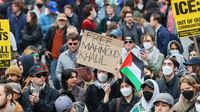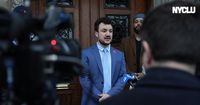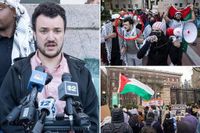In a startling episode that has ignited fierce debate across the nation, Mahmoud Khalil, a 30-year-old Syrian-born Algerian citizen of Palestinian descent and a graduate of Columbia University’s School of International and Public Affairs, was arrested by U.S. Immigration and Customs Enforcement (ICE) agents on March 8, 2025. Advocates for Khalil argue that his detention and the Trump administration's swift moves towards deportation reflect a troubling suppression of free speech in America, while critics assert that his pro-Hamas activism justifies such actions.
Khalil’s arrest has reverberated through various circles since it unfolded in front of his eight-months-pregnant wife, Noor Abdalla, who captured the scene with her mobile phone. Abdalla pleaded for information about her husband’s detention while dialing his legal counsel amidst her distress. The footage of the incident starkly displayed the lack of protocol, as agents did not read Khalil his Miranda rights before apprehending him and taking him away in a van amidst the chaos.
As an active participant in numerous protests at Columbia University and Barnard College following the onset of conflict in Gaza, Khalil is associated with the group Columbia University Apartheid Divest (CUAD). His activities have elicited both outrage and support, placing him at the heart of contentious debates about immigration, free speech, and national security according to legal experts. Notably, Alan Dershowitz, a prominent lawyer, acknowledged the probable unconstitutionality of Khalil's arrest during an interview with Newsmax, while recognizing the potential culpability he bears due to his “moral offenses.”
The Trump administration has referenced the Alien Enemies Act, designed for wartime scenarios, to rationalize Khalil's treatment, fueling claims of executive overreach. This act gives the president the authority to detain or deport individuals from enemy nations without a hearing, a claim that raises alarms regarding civil liberties and past instances of abuse during significant historical crises.
The legal framework being applied to Khalil has sparked concerns among civil liberties advocates. Michael Wildes, an immigration lawyer, stated that the “fighting words” doctrine deems certain speech unprotected under the First Amendment if deemed to instigate violence or immediate unrest. The essence of this case appears to pivot on whether Khalil’s actions equate to speech that incites such a breach of peace.
In a dramatic twist, legal proceedings have seen significant movement since his arrest. On March 10, 2025, Judge Jesse Furman ruled that Khalil be transferred from his detention in Jena, Louisiana, back to New Jersey, where key judicial proceedings will likely take place. This ruling derived from concerns about Khalil's rights being better protected in a more favorable legal environment, which many legal experts believe is crucial for achieving a fair hearing.
Aside from the legal ramifications of Khalil's case, a grassroots pro-Palestinian movement has emerged in response to the arrest, with rallies and petitions calling for his release. Khalil, who has proclaimed himself a political prisoner, drew parallels to other historical figures' struggles for justice, transforming him into a symbol of a wider resistance against perceived oppression.
Reflecting on the broader implications of this incident, Bruce Ackerman, a Yale law professor, voiced concern over the implications of using such a legal approach to address dissent. He warned of the dangerous precedent that could emerge from the unbridled power bestowed upon the administration, allowing for deportation based on opinion rather than action, which could have chilling effects on free speech rights for immigrants and non-citizens.
The federal government’s justification for Khalil’s deportation intertwines with recent political maneuvers, notably the Trump administration’s decision to withdraw $400 million in federal funding from Columbia University. Trump has framed this action as part of an ongoing fight against anti-Jewish racism on college campuses, a struggle he positions himself as a defender of, despite the growing criticism from various factions.
While addressing students' rights to protest and voice dissent, many have begun to view the issue through the lens of historical context, recalling the internment of Japanese Americans during World War II and the deportation of political dissidents in earlier American history. Khalil’s case is being cited as a potential warning signal of the risks involved when dissenting voices among marginalized groups are targeted.
Advocates like the ACLU and NYCLU have emphasized the importance of defending free speech across the board. In the words of Khalil, dictated from detention, “I have always believed that my duty is not only to liberate myself from the oppressor but also to liberate my oppressors from their hatred and fear.” His sentiments echo the thoughts of many activists who recognize the larger battle at stake in this case, viewing it as more than a personal struggle but rather a critical juncture in the fight for civil liberties in America.
This tumultuous situation has underscored the tensions prevalent on college campuses where politically charged movements clash with institutional policies and political agendas. As Khalil’s legal proceedings unfold, it’s clear that the outcomes will reverberate beyond one individual, potentially shaping the future landscape of activism, free speech, and civil liberties in America.



